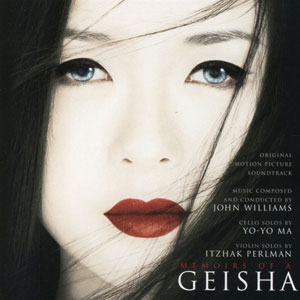************************************************************** EDITOR'S CHOICE February 2006 **************************************************************
Memoirs of a Geisha
Music composed by John Williams
Featuring cello solos by Yo-Yo Ma and violin solos by Itzhak Perlman
Available on Sony Classical (82876747082)
Running Time: 61:11
Crotchet Amazon US

As might be expected this new John Williams score is heavily accented towards Far Eastern musical forms, colour and rhythms. Once again Williams’ consummate craftsmanship makes for a rewarding listening experience, the music transcending the film. The usual Far Eastern forms are imaginatively extended, harmonies and orchestrations enriched, rhythms sharpened. Again he uses the artistry of Yo-Yo Ma and Itzhak Perlman (employed, notably, in Seven Years in Tibet and Schindler’s List respectively) to point up the emotions and atmosphere of this score.
The music has an appealing grace and beauty, and poignancy. Enchanting is the serene nocturnal music that is ‘Chiyo’s Prayer’. Quiet dignity and dedication to tradition is beautifully implicit in ‘Becoming a Geisha’. ‘Destiny’s Path’ is another lovely track with a minimalist feel, lifted by beautifully subtle modulations imagine, perhaps, ripples across the face of the moon. This beauty spills over into ‘A new name…a new life’ until its soft wind chimes are suddenly darkened. Besides the prevailing ethnicity there is conventional European music for ‘The Chairman’s Waltz’ (spilling over into other tracks like, ‘The Garden Meeting’) that has a richly romantic violin solo.
For a darker more menacing atmosphere, far eastern pipes*, heavy bass rolls and agitatedly plucked harp chords are used, as in Empire of the Sun, creating tension and menace culminating in ‘The Fire Scene and the Coming of War’ – the most substantial track on the album.. This explosive track includes a female solo voice and anguished ethnic material, all excerpts from Ogi No Mato (The Folding Fan as a Target)
* Used as solo in ‘Dr Crabb’s Prize’
John Williams delivers another enchantment
Ian Lace
4.5
Michael McLennan adds:-
A great man once said that Beethoven’s 5th Symphony was based on four notes, but all the world could not offer a musician who could have done more with such a humble foundation than Ludwig van. These words come to mind on hearing how Williams develops his modest theme for Zhang Ziyi’s character over the course of this fine album from Sony Classical. The theme is a haunting melody for cello and shakuhatchi in ‘Sayuri’s Theme’, a voice in the strings in ‘Journey to the Hanamachi’, a myriad of contrapuntal dervishes in ‘Becoming a Geisha’, and finally the climax of a cello concerto – an epiphanic cue for cello, oboe, horn and string orchestra and one of the finest tracks this year - ‘Confluence’. Yo Yo Ma and Williams achieve a powerful fusion of timbre and character that always heightens the role of music in character development – see Hilary Hahn and James Newton Howard in The Village, Joshua Bell and Nigel Hess in Ladies in Lavender or Anton Karas in The Third Man.And Sayuri’s Theme is just the beginning. Itzhak Perlman lends his craft to voice the romantic figure of The Chairman, the European waltz adopted by Williams capturing that character’s awkward middle-ground between foreign interests and local powerbroker’s in Japan. ‘Going to School’ turns cliché on its head with deft reworking of David Byrne’s main title from Bertolucci’s The Last Emperor. ‘Brush on Silk’ highlights virtuoso solo writing for taiko, shakuhatchi and the plucked koto in a frenetic rhythm. ‘Chiyo’s Prayer’ plays with these elements again, but in a manner much closer to Williams’ typical style. Cascades of harps lift the dreamlike ‘Destiny’s Path’. Rimsky-Korsakov-like orientalism is hinted at with the sinuous oboe-line in ‘As the Water…’, and the final cello duet of ‘A Dream Discarded’ between Yo Yo Ma and Steve Erdody (whose playing graces Williams’ Munich score as well) deconstructs a number of themes to their beautiful primitives.
Williams remains the finest living composer of his generation and all following. May his extraordinary voice grace film scores for as long as he is inspired to do so.
Michael McLennan
5
Return to Reviews Index